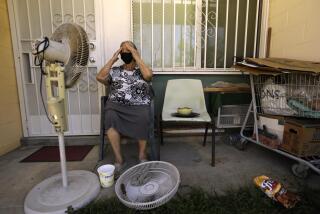U.N. panel gives the ‘plain facts’ on warming
united nations -- Behind Al Gore’s cry declaring global warming a “planetary emergency” lies the quiet scientific consensus created by a U.N. panel of more than 2,000 scientists from 130 countries.
The Intergovernmental Panel on Climate Change, which is sharing this year’s Nobel Peace Prize with Gore, has “assembled the plain facts about climate change,” said Tim Wirth, the president of the nongovernmental United Nations Foundation.
“Al Gore, in turn, has marshaled them brilliantly to tell the world about the dangers we face. Neither could have succeeded without the other; together, they have opened the eyes of millions to the urgent need for action,” Wirth said.
The Geneva-based IPCC was established in 1988 by two U.N. agencies, the World Meteorological Organization and the U.N. Environment Program, to review scientific data on climate change and offer possible responses.
A series of reports this year is credited with shifting the debate from whether human activity is causing climate change to how best to address the problem.
As a result of its meticulous, peer-reviewed process, the panel has become known as the preeminent authority on climate change. The Nobel committee praised the panel for creating an ever-broader consensus about the connection between human activities and global warming.
In announcing the award, the committee linked the roles of science and politics in creating the stability that allows for peace. Nobel Committee Chairman Ole Danbolt Mjos said that although “the Nobel committee is no scientific committee, the important thing is the message that the world is threatened by global warming.”
Greeted by the applause of well-wishers outside his office in New Delhi, IPCC Chairman Rajendra Pachauri said he was “completely overwhelmed by the honor.” Pachauri declared Gore a deserving co-winner. The BBC said the two congratulated each other by telephone, smoothing over Gore’s criticism of Pachauri as “the let’s drag our feet” candidate before the Indian was elected in 2002 to lead the panel.
The thousands of scientists and other experts who make up the panel are volunteers, contributing their time and expertise outside of their jobs in government, universities and the private sector.
Over two decades, these experts have produced four sets of reports to tell governments about the state of the global environment, said John M. R. Stone, vice chairman of the organization’s working group on the consequences of climate change.
At the United Nations, Secretary-General Ban Ki-moon said he was delighted by the honor for the IPCC, and noted that it was the ninth Nobel Peace Prize awarded to the U.N., its officials or agencies.
The IPCC’s findings established beyond doubt that climate change is happening, and that much of it is caused by human activity, Ban said in a statement. He said the organization had helped build momentum for action on climate change and recognition of the U.N. as the forum for reaching agreement on it.
Last month, Ban gathered world leaders in New York for a climate change summit and said the IPCC had established that the time for doubt had passed. He urged countries to act at a December meeting in Bali, Indonesia, that was called to update emissions-reduction targets set by the Kyoto Protocol in 1997.
“The scientists have very clearly outlined the severity of the problem,” Ban said. “Their message is simple. We know enough to act. If we do not act now, the impact of climate change will be devastating.”
Though the IPCC reports aim to be nonpolitical, their conclusions can affect national policies.
In an April report on the consequences of climate change, the United States and China softened the conclusion that adaptation and mitigation were necessary. The U.S. position is that conservation and new technologies are sufficient, and that it will not be bound by U.N.-mandated targets to reduce emissions.
The panel’s fourth assessment report, Climate Change 2007, will be released next month.
--
More to Read
Sign up for Essential California
The most important California stories and recommendations in your inbox every morning.
You may occasionally receive promotional content from the Los Angeles Times.










